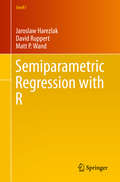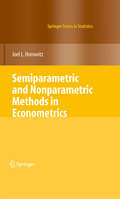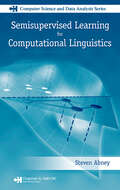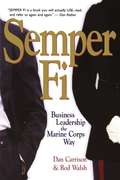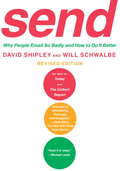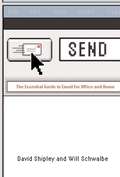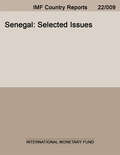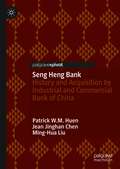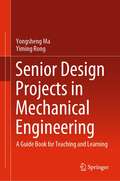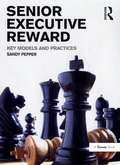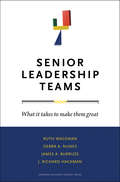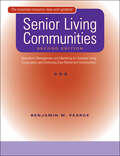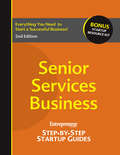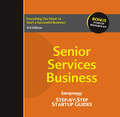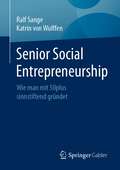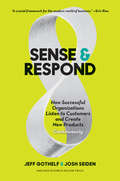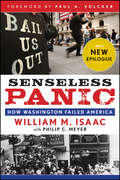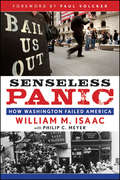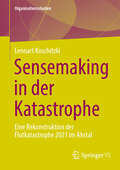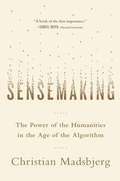- Table View
- List View
Semiglobalization and Strategy
by Pankaj GhemawatThis chapter summarizes evidence that the current state of the world is one of semiglobalization--increasingly, but far from completely, integrated--and explains why understanding this is essential for developing cross-border strategies. This chapter was originally published as chapter 1 of "Redefining Global Strategy: Crossing Borders in a World Where Differences Still Matter."
Semiparametric Regression with R (Use R!)
by David Ruppert Jaroslaw Harezlak Matt P. WandThis easy-to-follow applied book on semiparametric regression methods using R is intended to close the gap between the available methodology and its use in practice. Semiparametric regression has a large literature but much of it is geared towards data analysts who have advanced knowledge of statistical methods. While R now has a great deal of semiparametric regression functionality, many of these developments have not trickled down to rank-and-file statistical analysts. The authors assemble a broad range of semiparametric regression R analyses and put them in a form that is useful for applied researchers. There are chapters devoted to penalized spines, generalized additive models, grouped data, bivariate extensions of penalized spines, and spatial semi-parametric regression models. Where feasible, the R code is provided in the text, however the book is also accompanied by an external website complete with datasets and R code. Because of its flexibility, semiparametric regression has proven to be of great value with many applications in fields as diverse as astronomy, biology, medicine, economics, and finance. This book is intended for applied statistical analysts who have some familiarity with R.
Semiparametric and Nonparametric Methods in Econometrics
by Joel L. HorowitzStandard methods for estimating empirical models in economics and many other fields rely on strong assumptions about functional forms and the distributions of unobserved random variables. Often, it is assumed that functions of interest are linear or that unobserved random variables are normally distributed. Such assumptions simplify estimation and statistical inference but are rarely justified by economic theory or other a priori considerations. Inference based on convenient but incorrect assumptions about functional forms and distributions can be highly misleading. Nonparametric and semiparametric statistical methods provide a way to reduce the strength of the assumptions required for estimation and inference, thereby reducing the opportunities for obtaining misleading results. These methods are applicable to a wide variety of estimation problems in empirical economics and other fields, and they are being used in applied research with increasing frequency. The literature on nonparametric and semiparametric estimation is large and highly technical. This book presents the main ideas underlying a variety of nonparametric and semiparametric methods. It is accessible to graduate students and applied researchers who are familiar with econometric and statistical theory at the level taught in graduate-level courses in leading universities. The book emphasizes ideas instead of technical details and provides as intuitive an exposition as possible. Empirical examples illustrate the methods that are presented. This book updates and greatly expands the author's previous book on semiparametric methods in econometrics. Nearly half of the material is new.
Semisupervised Learning for Computational Linguistics (Chapman & Hall/CRC Computer Science & Data Analysis)
by Steven AbneyThe rapid advancement in the theoretical understanding of statistical and machine learning methods for semisupervised learning has made it difficult for nonspecialists to keep up to date in the field. Providing a broad, accessible treatment of the theory as well as linguistic applications, Semisupervised Learning for Computational Linguistics offer
Semper Fi: Business Leadership the Marine Corps Way
by Dan Carrison Rod WalshFor more than 200 years, the U. S. Marine Corps has been a paragon of world-class leadership, excelling in the areas of motivation, training, and management. Semper Fi - which since its hardcover publication has become a best-selling, business leadership classic - shows readers how to adapt these proven practices for their own organizations. Now in a paperback edition with a new introductionby the authors, Semper Fi goes behind the scenes to pinpoint what works for the USMC, showing readers how to create a training and management culture that brings out the best in all their employees. The book gives readers tough, practical tips for: * inspiring individual initiative * rewarding hard work * encouraging loyalty * working with limited resources * dealing with change * leading the troops at every level of the organization This is not, according to Dan Rather, one of those mumbo-jumbo, pseudo-philosophical books on leadership. Semper Fi is a book you will actually USE, read, and refer to again and again.
Send
by David Shipley Will SchwalbeThe Essential Guide to Email for Office and Home bull; When should you email, and when should you call, fax, or just show up? bull; What is the crucial-and most often overlooked-line in an email? bull; What is the best strategy when you send (in anger or error) a potentially career-ending electronic bombshell? Enter Send. Whether you email just a little or never stop, here, at last, is an authoritative book that shows how to write the perfect email anywhere. Send also points out the numerous (but not always obvious) times when email can be the worst option and might land you in hot water (or even jail!). The secret is, of course, to think before you click. Send is nothing short of a survival guide for the digital age-wise, brimming with good humour, and filled with helpful lessons from the authors' own email experiences (and mistakes). In short: absolutely e-essential.
Send: The Essential Guide to Email for Office and Home
by David Shipley Will SchwalbeThe hows and whys of using email, and how to communicate effectively.
Sendo extraordinariamente bem sucedido
by Gabriel Agbo Leandro PadilhaExcepcionalmente Bem-Sucedido! Deus destinou você a ser bem- sucedido. É direito teu. É tua natureza. Está em teu DNA. Você não tem desculpas para ser um fracasso. Tudo o que você precisará fazer nesta vida já está implantado em você e está incorporado na Palavra de Deus. Verdade. Este livro abrirá teus olhos para essa verdade eterna. Você não pode ir até o fim e continuar o mesmo. Você encontrará aqui tópicos como: Você pode ser Bem-Sucedido, As Coisas Não Estão Bem! Oh Senhor, Deus dos Céus, Ele guarda Sua Aliança, Ouça a Minha Oração, Conceda-me Sucesso e Favor, Visão-Plano-Trabalho, Cronometragem, Vencendo Obstáculos, Está feito! Você descobrirá os segredos do homem mais rico que já viveu, o mais forte e mais poderoso rei. E também orações que o porá automaticamente na trilha do sucesso. Deus não o designou para o fracasso. Ele o fez a Sua própria imagem e semelhança. O que simplesmente quer dizer que assim como ele é um sucesso, então você também deve ser. Você nasceu e foi salvo para o sucesso. Leia e seja transformado.
Sendwine.com
by Thomas R. Eisenmann Charmaine Ess Ann O'HaraSendwine.com, an online retailer of premium gifts of wine by the bottle, faced decisions about its growth strategy in mid-1999. Mike Lannon, president and founder, had established his company as a prominent player in an increasingly crowded field. But with success came a difficult choice: How should Sendwine.com spend the venture capital money it subsequently had attracted? Should the company consolidate its niche position in wine gift giving? Or should it aggressively expand into new gift-giving categories under the "Send.com" name?
Senegal: Selected Issues (Imf Staff Country Reports #Country Report No. 15/15)
by International Monetary Fund. African Dept.A report from the International Monetary Fund.
Seng Heng Bank: History and Acquisition by Industrial and Commercial Bank of China
by Jean Jinghan Chen Ming-Hua Liu Patrick W.M. HuenThis book examines the success story of Seng Heng Bank (SHB), the successful acquisition of SHB by Industrial and Commercial Bank of China (ICBC), and the continuing sound management and performance of ICBC (Macau). It shows how a loss-making small bank grew into one of the best banks in Macao and highlights the achievement, awards, and recognition of SHB. The authors detail the SHB acquisition process by ICBC, the biggest bank in the world in terms of total assets. They identify the main contributing factors for the success of SHB and draw conclusions and implications for bank managers in the region and beyond. This book will be of interest to finance professionals and business scholars.
Senior Design Projects in Mechanical Engineering: A Guide Book for Teaching and Learning
by Yongsheng Ma Yiming RongThis book offers invaluable insights about the full spectrum of core design course contents systematically and in detail. This book is for instructors and students who are involved in teaching and learning of ‘capstone senior design projects’ in mechanical engineering.It consists of 17 chapters, over 300 illustrations with many real-world student project examples.The main project processes are grouped into three phases, i.e., project scoping and specification, conceptual design, and detail design, and each has dedicated two chapters of process description and report content prescription, respectively. The basic principles and engineering process flow are well applicable for professional development of mechanical design engineers.CAD/CAM/CAE technologies are commonly used within many project examples. Thematic chapters also cover student teamwork organization and evaluation, project management, design standards and regulations, and rubrics of course activity grading. Key criteria of successful course accreditation and graduation attributes are discussed in details. In summary, it is a handy textbook for the capstone design project course in mechanical engineering and an insightful teaching guidebook for engineering design instructors.
Senior Executive Reward: Key Models and Practices
by Sandy PepperExecutive pay remains a contentious topic for many organizations. Unfortunately for company executives, much of the writing about it is either sensationalist or highly academic; none of it much help to the reader looking for a balanced and informed view of the subject. Sandy Pepper provides company executives, investors, and advisers with a summary of the main theories (from economics, game theory and the behavioural sciences) and best practices (in corporate governance, tax, accounting, compliance and so on) that relate to the compensation of senior executives. He also reviews the current state of corporate governance as it affects executive reward in Europe and the US. And he backs the text up with case study examples. Senior Executive Reward is an intelligent, practical and balanced explanation of the basis on which modern executives are compensated - and why. It is must-have reading for anyone who is interested in the complex and often controversial topic of executive pay, particularly remuneration committee members, professional advisers and senior executives anxious to understand for themselves (and explain to others) the basis on which they are rewarded.
Senior Leadership Teams: What It Takes to Make Them Great
by J. Richard Hackman Ruth Wageman Debra A. Nunes James A. BurrussAn organisation's fate hinges on its CEO--right? Not according to the authors ofSenior Leadership Teams. They argue that in today's world of neck-snapping change, demands on leaders in top roles are rapidly outdistancing the capabilities of any one person - no matter how talented. Result? Chief executives are turning to their enterprise's senior leaders for help. Yet many CEOs stumble when creatinga leadership team. One major challenge is that senior executives often focus more on their individual roles than on the top team's shared work. Without the CEO's careful attention to setting the team up correctly, these high-powered managers often have difficulty pulling together to move their organisation forward. Sometimes they don't even agree about what constitutes the right path forward. The authors explain how to determine whether your organisation needs a senior leadership team. Then, drawing on their study of 100+ top teams from around the world, they explain how to create a clear and compelling purpose for your team, get the right people on it, provide structure and support, and sharpen team members' competencies - and your own. Timely and practical, this book enables you to create and sustain a leadership team whose members learn from one another while collaborating to pursue your company's objectives.
Senior Living Communities: Operations Management and Marketing for Assisted Living, Congregate, and Continuing Care Retirement Communities
by Benjamin W. PearceThe demand for residential communities for seniors rises as the U.S. population continues to age. This growth means that new administrators and staff members often are learning by trial and error the complicated task of delivering high-quality and consistent services to elderly persons. While many new facilities have been successful, others have been plagued by a variety of administrative and financial difficulties. Senior Living Communities remains the definitive guide to managing these facilities.In this thoroughly updated and revised edition, Benjamin W. Pearce offers a wealth of sound advice and practical solutions. He discusses resident relations, operating methods, staffing ratios, department management, cost containment, sales and marketing strategies, techniques of financial analysis, budgeting, and human resources. New chapters address issues particular to dementia care and architecture, and the appendix contains a department-by-department audit of senior living operations.From the front lines to the boardroom, this book should be a part of every decision-making process for improving and maintaining assisted living, congregate, and continuing care retirement communities.
Senior Services Business
by Entrepreneur MagazineGrab Your Share of Senior CareThe senior population is multiplying by the millions! In fact, during the next 25 years, the senior population in America is expected to double-growing faster than the total population in every state. This means one thing-a tremendous opportunity for aspiring and compassionate entrepreneurs like you!From providing adult daycare or homecare to transportation or concierge needs, our experts cover today's most requested services within the 65+ market. Learn, step by step, how to choose the right opportunity for you, legally and financially establish your business, acquire licenses and certifications, set policies and procedures, and much more! Plus, gain priceless insight, advice, and tips from practicing senior care professionals.Learn how to:Discover your specialty within one of six growing areas of interest- adult daycare, relocation services, homecare, transportation services, concierge, and travel serviceDesign your business to suit your customers' demographics and special needsSet your ratesCreate a support staff who will help you succeedUse effective marketing and advertising to get the word outBuild valuable business partnerships that lead to referralsPlan for future growthA record number of seniors are seeking your help-start your senior care service today!The First Three YearsIn addition to industry specific information, you'll also tap into Entrepreneur's more than 30 years of small business expertise via the 2nd section of the guide - Start Your Own Business. SYOB offers critical startup essentials and a current, comprehensive view of what it takes to survive the crucial first three years, giving your exactly what you need to survive and succeed. Plus, you'll get advice and insight from experts and practicing entrepreneurs, all offering common-sense approaches and solutions to a wide range of challenges. Pin point your target market Uncover creative financing for startup and growth Use online resources to streamline your business plan Learn the secrets of successful marketing Discover digital and social media tools and how to use them Take advantage of hundreds of resources Receive vital forms, worksheets and checklists From startup to retirement, millions of entrepreneurs and small business owners have trusted Entrepreneur to point them in the right direction. We'll teach you the secrets of the winners, and give you exactly what you need to lay the groundwork for success.BONUS: Entrepreneur's Startup Resource Kit!Every small business is unique. Therefore, it's essential to have tools that are customizable depending on your business's needs. That's why with Entrepreneur is also offering you access to our Startup Resource Kit. Get instant access to thousands of business letters, sales letters, sample documents and more - all at your fingertips!You'll find the following:The Small Business Legal ToolkitWhen your business dreams go from idea to reality, you're suddenly faced with laws and regulations governing nearly every move you make. Learn how to stay in compliance and protect your business from legal action. In this essential toolkit, you'll get answers to the "how do I get started?" questions every business owner faces along with a thorough understanding of the legal and tax requirements of your business.Sample Business Letters1000+ customizable business letters covering each type of written business communication you're likelyto encounter as you communicate with customers, suppliers, employees, and others. Plus a complete guide to business communication that covers every question you may have about developing your own business communication style.Sample Sales LettersThe experts at Entrepreneur have compiled more than 1000 of the most effective sales letters covering introductions, prospecting, setting up appointments, cover letters, proposal letters, the all-important follow-up letter and letters covering all aspects of sales operations to help you make the sale, generate new customers and huge profits.
Senior Services Business
by The Staff of Entrepreneur MediaThe experts at Entrepreneur provide a two-part guide to success. First, learn how you can create a successful senior services business providing adult daycare, home transportation or concierge needs. Then, master the fundamentals of business startup including defining your business structure, funding, staffing and more.This kit includes: Essential industry-specific startup essentials including industry trends, best practices, important resources, possible pitfalls, marketing musts, and more Entrepreneur Editors' Start Your Own Business, a guide to starting any business and surviving the first three years Interviews and advice from successful entrepreneurs in the industry Worksheets, brainstorming sections, and checklists Entrepreneur's Startup Resource Kit (downloadable)More about Entrepreneur's Startup Resource KitEvery small business is unique. Therefore, it's essential to have tools that are customizable depending on your business's needs. That's why with Entrepreneur is also offering you access to our Startup Resource Kit. Get instant access to thousands of business letters, sales letters, sample documents and more - all at your fingertips!You'll find the following:The Small Business Legal ToolkitWhen your business dreams go from idea to reality, you're suddenly faced with laws and regulations governing nearly every move you make. Learn how to stay in compliance and protect your business from legal action. In this essential toolkit, you'll get answers to the "how do I get started?" questions every business owner faces along with a thorough understanding of the legal and tax requirements of your business.Sample Business Letters1000+ customizable business letters covering each type of written business communication you're likelyto encounter as you communicate with customers, suppliers, employees, and others. Plus a complete guide to business communication that covers every question you may have about developing your own business communication style.Sample Sales LettersThe experts at Entrepreneur have compiled more than 1000 of the most effective sales letters covering introductions, prospecting, setting up appointments, cover letters, proposal letters, the all-important follow-up letter and letters covering all aspects of sales operations to help you make the sale, generate new customers and huge profits.
Senior Social Entrepreneurship: Wie man mit 50plus sinnstiftend gründet
by Ralf Sange Katrin von WulffenDrei von vier der 50- bis 75-jährigen können sich gesellschaftliches Engagement im Alter grundsätzlich vorstellen, für 48% stellt die Gründung eines sozialen Unternehmens einen vorstellbaren Weg dar, sich für die Gesellschaft zu engagieren. In diesem Buch werden 12 ältere Sozialunternehmer aus Deutschland beispielhaft portraitiert. Es soll zur Inspiration für die Generation der Babyboomer dienen, die noch einmal etwas Neues wagen wollen. In einem Praxisteil wird der Weg zur Gründung eines eigenen Sozialunternehmens aufgezeigt.
Sense and Respond: How Successful Organizations Listen to Customers and Create New Products Continuously
by Jeff Gothelf Josh SeidenThe End of Assembly Line ManagementWe’re in the midst of a revolution. Quantum leaps in technology are enabling organizations to observe and measure people’s behavior in real time, communicate internally at extraordinary speed, and innovate continuously. These new, software-driven technologies are transforming the way companies interact with their customers, employees, and other stakeholders.This is no mere tech issue. The transformation requires a complete rethinking of the way we organize and manage work. And, as software becomes ever more integrated into every product and service, making this big shift is quickly becoming the key operational challenge for businesses of all kinds. We need a management model that doesn’t merely account for, but actually embraces, continuous change. Yet the truth is, most organizations continue to rely on outmoded, industrial-era operational models. They structure their teams, manage their people, and evolve their organizational cultures the way they always have.Now, organizations are emerging, and thriving, based on their capacity to sense and respond instantly to customer and employee behaviors. In Sense and Respond, Jeff Gothelf and Josh Seiden, leading tech experts and founders of the global Lean UX movement, vividly show how these companies operate, highlighting the new mindset and skills needed to lead and manage them-and to continuously innovate within them.In illuminating and instructive business examples, you’ll see organizations with distinctively new operating principles: shifting from managing outputs to what the authors call "outcome-focused management”; forming self-guided teams that can read and react to a fast-changing environment; creating a learning-all-the-time culture that can understand and respond to new customer behaviors and the data they generate; and finally, developing in everyone at the company the new universal skills of customer listening, assessment, and response.This engaging and practical book provides the crucial new operational and management model to help you and your organization win in a world of continuous change.
Sense of Place and Place Attachment in Tourism (Contemporary Geographies of Leisure, Tourism and Mobility)
by C. Michael Hall Girish Prayag Ning Chris ChenPlace is integral to tourism. In tourism, almost all issues can ultimately be traced back to human–place interactions and human–place relationships. Sense of place, also referred to as place attachment, topophilia, and community sentiment, has received significant attention in tourism studies because it both contributes to, and is affected by, tourism. This book, written by notable authors in the field, examines sense of place and place attachment in terms of a typology of sense of place/place attachment that includes genealogical/historical, narrative/cultural, economic, ideological, cosmological, and dynamic elements. Dimensions of place attachment such as place identity, place dependence, and affective attachment are discussed as well as place marketing, place making, and destination management. Complete with a range of illustrative international cases and examples ranging from Santa Claus to the importance of place in indigenous and traditional cultures, this book represents a substantial addition to knowledge on the inseparable relationship between tourism and place and will be of great interest to all upper-level students and researchers of Tourism.
SenseAim Technologies: Pricing to Win
by Elie Ofek Marco Bertini Oded Koenigsberg Eyal BiyalogorskyThis exercise serves to help students understand the proper role and use of costs in a firm's pricing decisions. The exercise is designed such that the learning of students evolves across a classroom session, starting from understanding which costs are relevant when setting the price of a product, progressing to a discussion on the wisdom of the traditional "cost-plus" approach to pricing, and ending with a demonstration of how to leverage cost information to construct an iso-profit curve-which, in turn, serves as a useful benchmark to assess possible price changes. These topics emerge as the result of hands-on calculations, where students make recommendations based on the data provided in the exercise, and in-class discussion, where students defend their preferred course of action and reflect on the biases and heuristics that may lead managers to misuse costs in pricing decisions.
Senseless Panic: How Washington Failed America
by William M. IsaacThe truth about the 2008 economic crisis from a Washington insider The 1980s opened with the prime interest rate at an astonishing 21.5 percent, leading to a severe recession with unemployment reaching nearly 11 percent. Depression-like conditions befell the country, the entire thrift industry was badly insolvent and the major money center banks were loaded with third world debt. Some 3,000 bank and thrifts failed, including nine of Texas’ ten largest, and Continental Illinois, which, at the time, was the seventh largest bank in the nation. These severe conditions were not only handled without creating a panic, the economy actually embarked on the longest peacetime expansion in history. In Senseless Panic: How Washington Failed America, William M. Isaac, Chairman of the Federal Deposit Insurance Corporation (FDIC) during the banking and S&L crises of the 1980s, details what was different about 2008’s meltdown that allowed the failure of a comparative handful of institutions to nearly shut down the world’s financial system. The book also tells the rousing story of Isaac’s time at the FDIC. Details the mistakes that led to the panic of 2008 and 2009 An updated paperback revision of the bestselling book on the 2008 economic crisis, including a fascinating new Epilogue Demystifies the conditions America faced in 2008 Provides a road map for avoiding similar shutdowns and panics in the future Includes a foreword by Federal Reserve Chairman Paul Volcker Senseless Panic is a provocative, quick-paced, and thoughtful analysis of what went wrong with the nation's banking system, a blunt indictment of United States policy, and a road map for making sure it doesn’t happen again.
Senseless Panic: How Washington Failed America
by William M. IsaacThe 1980s opened with the prime interest rate at an astonishing 21.5 percent, leading to a severe recession with unemployment reaching nearly 11 percent. Depression-like conditions befell the agricultural sector, a bubble burst in the energy sector, a rolling real estate recession swept the country, the entire thrift industry was badly insolvent and the major money center banks were loaded with third world debt. Some 3,000 bank and thrifts failed, including nine of Texas’ 10 largest, and Continental Illinois, which, at the time, was the 7thlargest bank in the nation. These severe conditions were not only handled without creating a panic, the economy actually embarked on the longest peacetime expansion in history. In Senseless Panic: How Washington Failed America, William M. Isaac, Chairman of the Federal Deposit Insurance Corporation (FDIC) during the banking and S&L crises of the 1980s, details what was different about 2008’s meltdown that allowed the failure of a comparative handful of institutions to nearly shut down the world’s financial system. The book also tells the rousing story of Isaac’s time at the FDIC. With accessible and engaging prose, Isaac: Details the mistakes that led to the panic of 2008 and 2009 Demystifies the conditions America faced in 2008, and Provides a roadmap for avoiding similar shutdowns and panics in the future Senseless Panicis a provocative, quick-paced, and thoughtful analysis of what went wrong with the nation's banking system and a blunt indictment of United States policy.
Sensemaking in der Katastrophe: Eine Rekonstruktion der Flutkatastrophe 2021 im Ahrtal (Organisationsstudien)
by Lennart KoschitzkiDieses Buch bietet eine soziologische Perspektive auf die Flutkatastrophe 2021 im Ahrtal – und zeigt damit Strukturen und Bedingungen auf, welche im Hintergrund der Flutnacht zu ihren tragischen Ausmaßen führten. Nach Desastern steht oft die Frage im Raum, wie es trotz nachweislich vorliegender Warnsignale zu einer derartigen Eskalation kommen konnte. Auch nach der Flut im Kreis Ahrweiler erscheinen die Fehlentscheidungen bei den Verantwortlichen nicht nachvollziehbar. In diesem Buch wird zur Beleuchtung dieser Rätsel ein anderer Blickwinkel vorgeschlagen: Das kritischste Element der Flutkatastrophe und deren missglückter Bewältigung lag nicht in Fehlentscheidungen, sondern in den zugrundeliegenden Fehleinschätzungen. Unter Zuhilfenahme von „Sensemaking“ nach Karl E. Weick werden diese Fehleinschätzungen vom 14. und 15. Juli 2021 in ihren Kontexten sicht- und greifbar gemacht. Neben dem fokussierten Krisenstab in Bad Neuenahr-Ahrweiler werden auch weitere zentrale Akteure und widrige Gegebenheiten dieses Zusammenhangs untersucht. Darüber hinaus werden organisationale Einflussfaktoren der Flutkatastrophe herausgestellt; denn wie bei allen Katastrophen bildete sie sich aus dem Zusammenspiel mehrerer, teils völlig voneinander unabhängiger Aspekte. Für das ergänzende Verständnis wird neben einer einführenden Rekonstruktion des Katastrophenhergangs auch eine Einordnung von Krisenstäben als organisationaler Sonderform im hier betrachteten Sinne geboten. Daraus ergibt sich die Gelegenheit, aus den Geschehnissen im Kreis Ahrweiler zu lernen. Damit bietet dieses Buch insbesondere für Katastrophenforscher und Katastrophenschützer Impulse und Lektionen.
Sensemaking: The Power of the Humanities in the Age of the Algorithm
by Christian MadsbjergBased on his work at some of the world's largest companies, including Ford, Adidas, and Chanel, Christian Madsbjerg's Sensemaking is a provocative stand against the tyranny of big data and scientism, and an urgent, overdue defense of human intelligence. Humans have become subservient to algorithms. Every day brings a new Moneyball fix--a math whiz who will crack open an industry with clean fact-based analysis rather than human intuition and experience. As a result, we have stopped thinking. Machines do it for us. Christian Madsbjerg argues that our fixation with data often masks stunning deficiencies, and the risks for humankind are enormous. Blind devotion to number crunching imperils our businesses, our educations, our governments, and our life savings. Too many companies have lost touch with the humanity of their customers, while marginalizing workers with liberal arts-based skills. Contrary to popular thinking, Madsbjerg shows how many of today's biggest success stories stem not from "quant" thinking but from deep, nuanced engagement with culture, language, and history. He calls his method sensemaking. In this landmark book, Madsbjerg lays out five principles for how business leaders, entrepreneurs, and individuals can use it to solve their thorniest problems. He profiles companies using sensemaking to connect with new customers, and takes readers inside the work process of sensemaking "connoisseurs" like investor George Soros, architect Bjarke Ingels, and others. Both practical and philosophical, Sensemaking is a powerful rejoinder to corporate groupthink and an indispensable resource for leaders and innovators who want to stand out from the pack.

